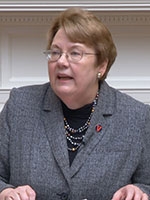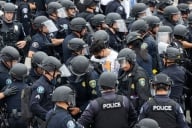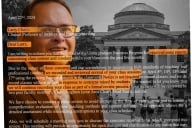You have /5 articles left.
Sign up for a free account or log in.

Teresa Sullivan
U. of Virginia
University of Virginia President Teresa Sullivan on Monday acknowledged the role that excessive drinking and a social scene dominated by parties at fraternity houses have played in sexual violence on campus.
After a handful of recent high-profile stumbles by university leaders talking about the intersection of alcohol and sexual assault, Sullivan spoke about the issues in a way that did not appear to blame women.
Comments by other presidents that did appear to place some blame on rape victims were met quickly with criticism online and via social media. Yet response to Sullivan’s remarks has been, if not praised, at least not widely criticized in the hours following the speech.
Her speech to students Monday was the latest of several campus-wide letters and statements regarding the fallout from a Rolling Stone article published last month that described a brutal on-campus gang rape. The article also was highly critical of what it described as a campus culture that turned a blind eye to sexual assault.
Sullivan said that university leaders know much of the student population drinks and that binge drinking is a problem.
“Alcohol does not cause rape, but alcohol is often a tool of the predator,” she said.
Women and men should know what they’re drinking and where their drink came from, and women have to understand that their usually smaller body weight means that smaller amounts of alcohol will have a bigger effect on them, she said.
“The predators certainly know this,” Sullivan said. “Serving sweet-tasting but high-proof punches to women, while the guys sip a few beers, is often described as the prelude for taking advantage of the women.”
She also touched on date rape drugs: “Let’s call this by its name: this is poisoning. And it should be legally prosecuted as such.”
Finding the right tone when addressing men, women, alcohol and sexual assaults has been problematic for university leaders at a time when colleges are under increased pressure to prevent and punish sexual violence on campus. Many have been accused by students, alumni or advocates for sexual assault victims of using words that either implicitly or explicitly blame women for making themselves victims by drinking too much.
Eckerd President Donald R. Eastman III was criticized for recommending that students limit their alcohol consumption and avoid casual sex. Stephen Joel Trachtenberg, the former president of George Washington University, also took heat for saying women need to drink less so they can be sober enough to rebuff unwanted advances.
Denise Walsh, a U.Va. associate professor of politics and women, gender and sexuality, said Sullivan set the right tone in her speech by expressing her concern about the issue, her gratitude for the responses of students and faculty so far, and her desire to have U.Va. be a leader in addressing its sexual assaults
Sullivan noted that alcohol doesn't cause sexual assault, but also recognizes that alcohol abuse is still part of the wider discussion on preventing sexual violence since many assaults involve alcohol, Walsh said in an email.
“Studies show that college men think that when college women drink, that they want sex, but this is not true,” she said. “Drinking culture is thus closely intertwined with rape culture.”
English Associate Professor Victoria Olwell, who helped organize a “Take Back the Party” rally last week to protest sexual assaults on campus, said she hadn't had time to digest Sullivan's speech yet. But she did caution against putting too much attention on the words and actions of high-profile university leaders.
Olwell said she’s concerned that the media focus on particular people distracts from the institutional problems that have allowed sexual assault to become such a problem on campuses, such as allowing colleges to adjudicate sexual assault claims or how the undergraduate social scene facilitates sexual violence.
In her speech, Sullivan outlined several changes that will take place starting next semester and said that her major priority in the coming months will be examining the campus's culture. The university will hire an additional trauma counselor for the Women’s Center and provide bystander training for all faculty and students to teach them how to intervene to prevent sexual assaults.
There will also be an anonymous student survey on sexual misconduct, and the administration will consider whether the university has struck the right balance between supporting survivors who confide in counselors and encouraging them to report the crime.
All social activities at fraternities have been suspended until January, and Sullivan said she’s working with the organizations to draft new agreements to keep students at social events safe. But Sullivan did say the university community has to be careful not to place the blame too broadly on Greek life and fraternities, since there are fraternity men on campus who are just as disgusted by the allegations.
She ended her speech by saying she would periodically update the community on the progress the university makes on those efforts.
“Rape is a national problem," she said. "...Now our university has been placed at the center of this crisis. We will not shrink from it. We will lead."








